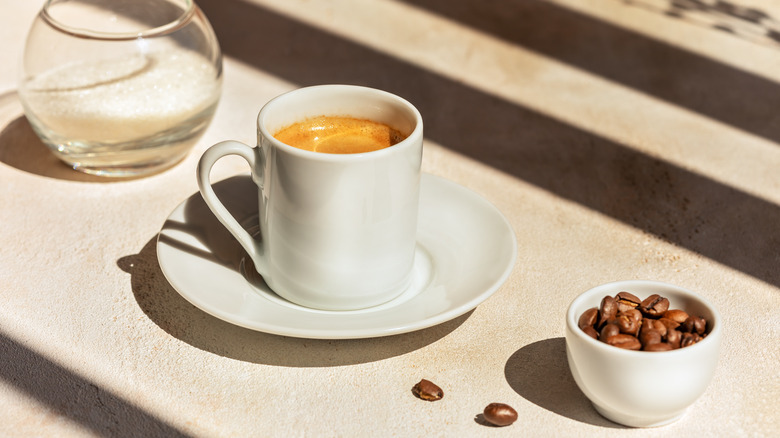This Bach Cantata Reveals A Strange Truth About Coffee
Could you ever fathom a time when coffee was any less popular than it is today? Worse yet, a world where coffee was frowned upon? As hard as it may seem that the drink we consider to be life-juice today could ever be considered any less precious, coffee didn't always have a good reputation. Per History Hustle, coffee was a much-loved beverage in the 1600s Ottoman Empire, long before it ever came to Europe. In fact, coffee was so popular there that even making it illegal and the threat of having one's head cut off as punishment didn't stop coffee drinkers from drinking their caffeinated beverage.
When coffee came to Europe through trade channels with the Middle East, staunch Catholics associated coffee with Muslims and Islam and thought of it as the devilish drink of Satan. It was only when Pope Clement VIII had a sip of coffee and reportedly proclaimed, "This Satan's drink is so delicious that it would be a pity to let the infidels have exclusive use of it" that coffee became acceptable.
Prominent composer Johann Sebastian Bach wrote the music for a comic opera in the 1730s on the woes of coffee drinking, famously known as the "Coffee Cantata." Bach's composition, written in the 1730s with lyrics by Picander (per Bon Appétit), speaks of a young girl, Aria, who seems to be much too obsessed with coffee to her father's liking.
Coffee was once considered a devilish and Satanic drink
"Father sir, but do not be so harsh! If I couldn't, three times a day, be allowed to drink my little cup of coffee, in my anguish I will turn into a shriveled-up roast goat," whines Aria to her father (via Open Culture).
Even with the pope's blessing 100 years earlier, coffee in the 1730s was considered a drink unfit for anybody of good social standing. According to Bon Appétit, coffee houses at the time were notorious places for partying, improper contact between men and women, and a place where everything socially unacceptable took place.
Aria's father naturally didn't want her to be associated with anything devilish and so forbade the wistful Aria from buying pretty dresses, attending weddings or parties and, as a last resort, from finding a husband until she gave up coffee. "Ah! How sweet coffee tastes, more delicious than a thousand kisses, milder than muscatel wine. Coffee, I have to have coffee, and, if someone wants to pamper me, ah, then bring me coffee as a gift!" Aria reasoned.
Ultimately, Aria's charms worked. Not only was she allowed to finally marry a suitable husband, but her father added a clause in the marriage contract that allowed Aria three coffees a day (via Sprudge). Perhaps Bach's cantata helped pave the way for coffee's eventual respectability. Though if it were written in the 21st century, would three be considered enough?

